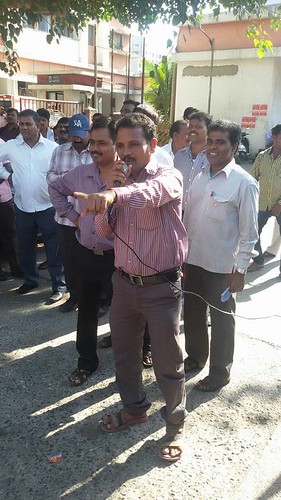By Shiva Thorat, TwoCircles.net
It would not be an exaggeration to say that manual scavenging remains one of the worst forms of caste atrocities in the country. For the upper castes and the middle class, such a job is an abomination to a point where let alone doing the work, they even cover their faces when people involved in manual scavenging cross their paths. The long rail tracks, the lifeline of Mumbai, are littered with human waste, and cleaning it remains a job that is almost exclusively reserved for the Dalits.
For Dadarao Patekar, 43, covering his face is not an option. For the past 18 years, he has been a safai karamchari and has done a job many would never imagine doing. For commuters who use the station and often cover their faces due to the stench, it would not involve a lot of imagination to begin understanding the nature of this work. But a conversation with Patekar shows that beyond the job itself, the issues that his fellow workers face highlight how badly they have been treated all this while. Patekar is a contract safai karmachari in the Brihanmumbai Municipal (BMC) and deputy president of Kachara Vahatuk Shramik Sangh (KVSS).

Dadarao Patekar
Patekar is a sharp personality. He rubbishes the ideas of upward social mobility,and believes that such terms are hypocritical and fail to explain why it is almost always people from a certain community who are forced into this inhuman profession for the lack of a better choice. As he says, the truth is most of the people engaged in this profession are from the Dalit community and no amount of theories and analyses can justify practises that essentially find their origins in casteism. It does not, for example, why Patekar’s father had to migrate from the drought-prone area of Marathwada, or why he could never complete his education due to caste-based poverty.
Patekar says, “caste-based profession only can demolished when deprived class will get education. Mahatma Phule fought in his era, still it is the same. We have to fight like Mahatma Phule, to destroy the evil society of caste system. We need to organise and educate ourself”.
But beyond rhetoric, Patekar’s bigger concern is the way the contract workers are treated. There are two class of workers in BMC: permanent and temporary (contract-based). Dadarao says, “it is like caste system that permanent worker gets respect and temporary worker doesn’t get. Caste system makes them more Dalit than the Dalits”. In fact, despite the claims that caste becomes a mere footnote in cities like Mumbai, it is impossible to not notice casteism, when one dons the glasses of contract safai karamcharis. From doctors to lawyers, everyone neglects them because they have to clean human excreta. Patekar says the struggle for their rights is a long and tough road. “There is lot of ongoing rallies and assertions against this. Every month we organise two or three morchas or produce statements in front of regime to show that we are asserting more than we can,” he says.
Beyond the glares of the society, Patekar stresses that the fight is equally, if not more, on economic front. Contract workers are not paid allowances by the BMC, and are not even provided with basic equipment like handgloves, raincoat and shoes. Contract workers have to do all the work without any security. Recently, in an incident safai karmachari from Thane got injured and Thane Municipality did not pay any heed. To protest against this incident KVSS protested and organised symbolic mayat yatra (Death ceremony) of Thane Municipal corporation.
Patekar in his life has organised more than thousand rallies. Recently, in Kurla juggis, KVSS called a meeting on a privatisation and market of education. Neeta Salve the resident of the Kurla said, “I really embraced what Dadarao said because I never had this kind of knowledge of education. I assumed that education is expensive so no need to educate my child. Dadarao make me believe that there are good people who really work for the society and that education remains the strongest way to fight casteism.”.
Patekar said, “Only through education, we can become strong so that the oppressors are scared to oppress Dalits”. He also said that, “no Brahmins, Maratha and Kshatriyas is safai karmachari but still they demand an end to reservation”.
“Contract workers are in very bad situation. We did not do much in our career but I will work for future. I don’t want to see my children do this work,” said Patekar.
Patekar goes at 8 AM on work and finishes his work by 2 PM everyday, after that he works for KVSS all the time. He wishes an end to caste system so that his coming generation will not have to do inhuman work that effect to the mental health and physical health too.
In Mumbai there are 24 wards and every ward has more than1,000 safai karamcharis. To organise them it is important to talk to them personally and mobilise them. He said, “BJP, RSS mixe government will run varna system and to ensure that this continues, they deny the allowances that should be paid to Safai karamcharis,” he says. This fight is likely to continue and it is unlikely that Patekar will give up. That has never been his nature.
Related:

